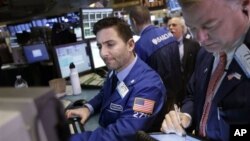World markets are opening the new year on a high note, after the U.S. Congress reached a deal to avert an early 2013 financial crisis that threatened to send the world's largest economy into recession.
In the U.S., key stock markets all jumped about 2 percent in Wednesday trading. Stocks also surged in Europe, with markets in London, Frankfurt and Paris all ending the day up more than 2 percent.
Earlier, Asian markets welcomed the U.S. legislative action in the first trading of the new year, with Hong Kong ending up 2.9 percent, Sydney gaining 1.2 percent, and Seoul adding 1.7 percent. Markets in Japan and China were closed for public holidays.
Major concerns loom
Late Tuesday, the House of Representatives reached a deal to avoid $500 billion in spending cuts and tax increases, endings weeks of quarreling that had overshadowed global markets. While the deal will provide short-term certainty, analysts say it will not do much to address investor concerns about the future since decisions on large spending cuts were delayed two months.
British financial strategist David Buik of the Cantor Index said he is concerned the U.S. reached its $16.4-trillion borrowing limit on Monday and will also have to decide in the coming weeks whether to increase the debt ceiling. Without the ability to borrow more money, the U.S. would face an unprecedented circumstance - running out of money to avoid defaulting on some of its financial obligations.
"We have avoided it [the 'fiscal cliff'], but it is a fudged deal and I think anybody who thinks that it's anything else probably deludes themselves," he said. "I think we are going to hit problems again come February when President Obama presents his budget for 2014. Clearly one of the issues in that is going to be the debt ceiling and the budget deficit, which clearly at $16.4 trillion is wholly unacceptable.''
In the U.S., key stock markets all jumped about 2 percent in Wednesday trading. Stocks also surged in Europe, with markets in London, Frankfurt and Paris all ending the day up more than 2 percent.
Earlier, Asian markets welcomed the U.S. legislative action in the first trading of the new year, with Hong Kong ending up 2.9 percent, Sydney gaining 1.2 percent, and Seoul adding 1.7 percent. Markets in Japan and China were closed for public holidays.
U.S. Fiscal Deal Facts
U.S. FISCAL DEAL FACTS- Raises $600 billion over 10 years through higher taxes on wealthier Americans
- Delays by two months billions of dollars in mandatory defense and domestic spending cuts
- Extends farm bill provisions to prevent a spike in milk prices
- Blocks cuts to payments for doctors who treat elderly Americans
- Extends unemployment benefits to 2 million people for one year
- Cancels a $900 cost-of-living raise for members of Congress
- Extends child tax credits, and those for college tuition and renewable energy
Late Tuesday, the House of Representatives reached a deal to avoid $500 billion in spending cuts and tax increases, endings weeks of quarreling that had overshadowed global markets. While the deal will provide short-term certainty, analysts say it will not do much to address investor concerns about the future since decisions on large spending cuts were delayed two months.
British financial strategist David Buik of the Cantor Index said he is concerned the U.S. reached its $16.4-trillion borrowing limit on Monday and will also have to decide in the coming weeks whether to increase the debt ceiling. Without the ability to borrow more money, the U.S. would face an unprecedented circumstance - running out of money to avoid defaulting on some of its financial obligations.
"We have avoided it [the 'fiscal cliff'], but it is a fudged deal and I think anybody who thinks that it's anything else probably deludes themselves," he said. "I think we are going to hit problems again come February when President Obama presents his budget for 2014. Clearly one of the issues in that is going to be the debt ceiling and the budget deficit, which clearly at $16.4 trillion is wholly unacceptable.''





